Claims Akufo-Addo gifted Honyenuga 2 cars to jail Opuni & Agongo 'malicious' – Judges
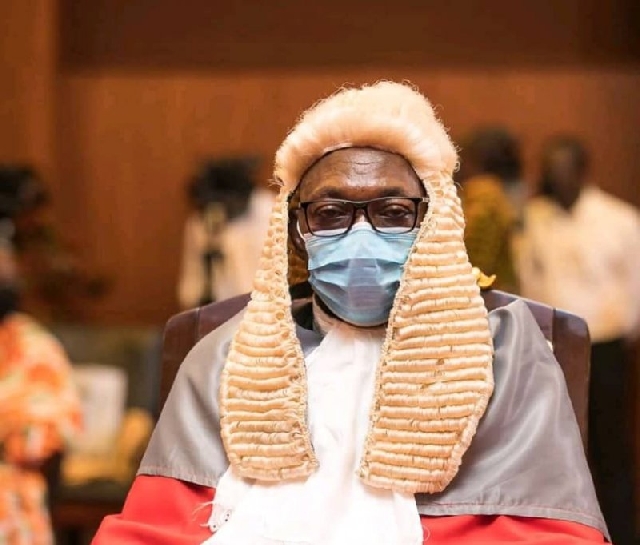 Justice Clemence Honyenuga
Justice Clemence Honyenuga
The Association of Magistrates and Judges of Ghana has denied claims that Justice Clemence Honyenuga of the Supreme Court received two new vehicles, an SUV and saloon car, from President Nana Akufo-Addo to influence him in the ongoing GHS217 million financial loss case involving former COCOBOD CEO Stephen Opuni and businessman Seidu Agongo.
The President of the Association, Justice Henry Kwofie, told journalists in Accra that: “This allegation, which is being thrown around all over the place especially on social media, we find extremely malicious, unfounded, and we see it as a deliberate attempt to cause disaffection for Justice Honyenuga, to His Lordship, the Chief Justice, and the judiciary in general, and we take a strong exception, and we also see it as an attempt to scandalise the judiciary, and we take a strong exception to it.”
Justice Honyenuga was removed from the case but reinstated after Attorney General Godfred Dame filed a review application that overturned his prohibition.
A few weeks ago, the opposition National Democratic Congress (NDC), said the manner the Opuni-Agongo trial is proceeding does not convince Ghanaians that justice will be served at the end of the day.
A press statement issued by the party on Sunday, 14 November 2021, signed by General Secretary Johnson Asiedu Nketia said: “It is doubtful” whether “the trajectory” of the trial of Dr Stephen Kwabena Opuni, Seidu Agongo and Agricult with its twists and turns would convince the ordinary and well-informed citizen that the ends of justice would be served regardless of the outcome of the case”.
“It is in this regard and without prejudice to the pending criminal trial of the accused persons that we call on the Attorney General and Minister of Justice to stop the persecution of the accused persons by withdrawing the charges or entering a nolle prosequi”, the party said.
“We believe that such a course of conduct is appropriate because the action of the Attorney General in the past in escalating a simple criminal trial to the level of political gamesmanship with Dr Stephen Kwabena Opuni being mischievously presented as the poster child of NDC-government corruption who must be jailed by all means because ‘fair is foul and foul is fair’ make it abundantly clear that the criminal trial of the accused persons is not a criminal prosecution. Instead, it is political persecution by the Attorney General masquerading as an exercise in rule of law and criminal justice”.
Read the full statement below:
PRESS STATEMENT BY THE NATIONAL DEMOCRATIC CONGRESS ON THE REVIEW RULING OF THE SUPREME COURT DATED 26TH OCTOBER 2021 IN THE DR. STEPHEN KWABENA OPUNI, SEIDU AGONGO AND AGRICULT CASE.
14th November 2021
REVIEW RULING OF THE SUPREME COURT ON THE OPUNI MATTER – A TRAVESTY OF JUSTICE.
1. The National Democratic Congress (NDC) has taken note and carefully reviewed the ruling by the Majority of the review panel of the Supreme Court dated 14th November 2021 ⁷setting aside the ruling of the ordinary bench of the Court dated 28th July 2021.
The ruling of the ordinary bench quashed parts of the ruling of Justice Clemence Jackson Hoeyenuga, JSC (“Judge”) on a submission of no case. In his impugned ruling, Justice Clemence Jackson Hoeyenuga had excluded 18 exhibits that had been accepted in evidence without any objection from any of the parties. The excluded exhibits supported the case of Dr Stephen Kwabena Opuni, Seidu Agongo and Agricult, as they demonstrated the falsity of the claims of the prosecution that the lithovit fertiliser COCOBOD purchased from Agricult was not of good quality.
Strangely, similar exhibits tendered through the same investigator through whom the 18 excluded exhibits were tendered and which suggested that lithovit fertiliser was inefficacious retained by the judge without preferring any justification for his unequal and partial treatment of the exhibits that were adduced in evidence in identical circumstances.
2. In a significant and radical departure from established standards, the Judge, Justice Clemence Jackson Hoynenuga in his ruling on the submission of no case made categorical, definitive and prejudicial statements that suggested that there was a real likelihood that he had an operative bias against the accused persons. These categorical and prejudicial statements included the following:
a. “All these were perpetuated to facilitate the 2nd and 3rd accused’s business and defraud COCOBOD by supplying a different product from what was tested and approved.”
b. “…However, the 1st accused although he knew the correct state of affairs and knowingly facilitated and aided the 2nd and 3rd accused to defraud COCOBOD,”
c. “The 1st accused made things easier for the 2nd and 3rd accused to succeed in their enterprise of defrauding.”
d. “The 1st accused, a scientist with all his knowledge and skill had the benefit of an original Lithovit Foliar fertiliser submitted, tested and approved by him yet knowingly he agreed and caused the State to lose millions of cedis in foreign exchange by paying these monies to the 2nd and 3rd accused persons. The 1st accused thus caused financial loss through this action.”
“Pages 54, 55 and 59 of the ruling on the submission of no case”
3. It was on the basis of the above that the ordinary bench of the Supreme Court on 28th July 2021 quashed parts of the ruling of the trial Judge excluding the 18 exhibits and further prohibited him from hearing the criminal case in order to protect the accused persons’ right to a fair trial.
Many observers welcomed the decision of the ordinary bench, which they considered to be reasonable, sensible and fair. Definitely, to the ordinary person the action of a Judge who excludes evidence that favours one party and retains on the record similar evidence favourable to another party and in addition, makes such prejudicial and conclusive statements as referenced in paragraph 2 above without having first heard the defence of the accused persons cannot in the ordinary scheme of life and the understanding of reasonable persons be described as keeping the scale of justice on an even keel.
4. However, in a strange move that suggested that the Attorney General is out of step with the reasonable expectations of the majority of well-informed Ghanaians who consider public confidence in the judiciary as the bedrock of our democracy, the Attorney General filed a review application seeking a reversal of the ruling of the ordinary bench of the Supreme Court. Of the reasons offered by the Attorney General in seeking a review, the most laughable was his claim that “the prosecution will be put to enormous expense, inconvenience and hardship in commencing a new trial…”.
5. Unfortunately, an enhanced panel of seven judges, including two (2) additional judges to the original panel of five (5), granted the application of the Republic on 26th October 2021, by 4 to 3 majority decision, and reversed the ruling of the ordinary bench. This meant that the Supreme Court had affirmed and endorsed the exclusion of the 18 exhibits and further given judicial approval for the Judge to continue with the hearing of the Opuni case in spite of the prejudicial comments he made which is referenced in paragraph 2 above.
It is worthy of note that the ruling of the enhanced panel was preceded by its own drama. Despite the rules of ethics of the Bar that parties to an action must avoid ex-parte communication with judges sitting on matters in which they are involved, the Attorney General and Minister of Justice, Godfred Yeboah Dame paid a visit to Justice Jones Dotse, the presiding Judge in the review application, to “discuss Ghana School of Law matters” on 11th October 2021. While we cannot confirm what was indeed discussed at the meeting, the conduct of the Attorney General in visiting Justice Jones Dotse exhibits poor judgment of the highest order and casts a cloud of suspicion over what was discussed at the said meeting.
6. In another example of poor judgment, the Attorney General, after the delivery of the ruling of the review panel, described the majority ruling of the ordinary bench that ruled in favour of Dr Stephen Kwabena Opuni as “an aberration of justice” and that Dr Stephen Kwabena Opuni was running away from “Judgment Day”. The question that needs to be asked is whether the Attorney General is privy to the eventual conviction and imprisonment of Dr Stephen Kwabena Opuni by Justice Clemence Jackson Honyenuga on “Judgment Day”. And if we may ask, of all the judges in Ghana, why should Justice Clemence Jackson Hoeyenuga be the only judge to hear the criminal trial involving Dr Stephen Kwabena Opuni, Seidu Agongo and Agricult.
We in the NDC are confident that if the words uttered by the Attorney General had been said by other lawyers they would have earned an invitation to the Disciplinary Committee of the General Legal Council for breaches of the ethical rules of the Bar.
7. As a party, we are vehemently opposed to the ruling by the Majority of the review panel of the Supreme Court dated 26th October 2021. There are certain features of the majority's ruling that cause us great concern. In the first place, the characterisation by the majority of the prejudicial statements made by the Judge as referenced above as constituting the Judge’s evaluation of the evidence and his expression of opinion on the quality of the evidence before him beggars belief and raises more questions than answers.
We are at a loss as to why the Supreme Court would prohibit a High Court Judge from hearing the Kennedy Agyapong Contempt Case on the basis of real likelihood of bias just because the Judge had used the expression “severely punished” while the same court did not see a real likelihood of bias against the accused persons from the clear prejudicial statements of the presiding Judge in the Opuni case stated above. Strangely, the review majority failed or neglected to make any reference to its ruling in the Kennedy Agyapong contempt case, the most recent Supreme Court authority on judicial bias.
8. Even more bizarre and worrying is the fact that the review majority committed patent and avoidable factual errors in their ruling of 26th October 2021. As has been said about the US Supreme Court, and we believe this holds true also for our Supreme Court, “We are not final because we are infallible, but we are infallible only because we are final”. The finality of Supreme Court judgments, of necessity, casts a duty on the court to avoid errors that could easily be avoided upon close scrutiny of the record of a case.
It is unfortunate that the review majority committed an avoidable factual error when it stated on page 11 of the ruling that: “It must be remembered that the only question brought to the court was whether the trial judge had committed a jurisdictional error by failing to call on the accused person to speak to the excluded exhibits before ruling that the exhibits could be excluded, and not whether the exhibits were admissible or inadmissible per se”. In our humble view, this is patently incorrect since the grounds of review of Dr Stephen Kwabena Opuni challenging the Judge’s ruling on the submission of no case make no reference to “jurisdictional error”.
The grounds simply stated that:
a. “The learned High Court judge committed a grievous error of law apparent on the face of the record when contrary to the express provisions of statute and more specifically section 6 of the Evidence Act, 1975 (NRCD 323), he suo motu rejected exhibits 58, 59, 60, 61, 62, 63, 64, 65, 66, 67, 68, 69, 70, 71, 72, 73, 74, and 75 after earlier admitting same during the hearing of the case without any objection from the Court or the Interested Party.
b. The learned High Court judge committed a grievous error of law apparent on the face of the record when after earlier admitting exhibits 58, 59, 60, 61, 62, 63, 64, 65, 66, 67, 68, 69, 70, 71, 72, 73, 74, and 75, he suo motu in his judgment rejected these exhibits without giving Applicant an opportunity to be heard before the subsequent rejection as required under the rules of natural justice.
c. There is a real likelihood of bias on the part of the trial judge, Clemence Jackson Honyenuga (JSC) sitting as an additional High Court judge in view of the fact that he has made final findings of facts and has predetermined and prejudged the case before hearing Applicant.
d. There is a real likelihood of bias on the part of the trial judge, Clemence Jackson Honyenuga (JSC) sitting as an additional High Court judge in that in the said ruling he exhibited patent bias against the interest of the Applicant when he rejected exhibits 58, 59, 60, 61, 62, 63, 64, 65, 66, 67, 68, 69, 70, 71, 72, 73, 74, and 75 which support the case of the Applicant but retained exhibits PP, LL series, and MM series which are statements obtained in identical circumstances to support the case of the Prosecution and which were tendered through the same PW7 by the Interested Party.”
9. It is instructive to note that the majority decision of the ordinary bench did not pursue any analysis based on “jurisdictional error”. As one of the dissenting judges noted on page 41 of the review ruling “The majority decision [of the ordinary bench] said nothing about the jurisdiction of the High Court. It is, therefore, misleading to submit that even if the High Court committed an error of law such an error “does not amount to a jurisdictional error patent on the face of the record amenable to certiorari”.
Furthermore, the grounds for review of the Dr Stephen Kwabena Opuni as stated in paragraph 8 above, made no reference whatsoever to “jurisdictional error”. The above notwithstanding the review majority erroneously reframed the central issue as a matter of “jurisdictional error” and pursued an analysis in that regard that was unresponsive to the case that had been presented by the accused persons, particularly in relation to breaches of the rules of natural justice.
10. Another patent and avoidable factual error made by the review majority was the claim that: “on the issue of the Respondents not having been heard before the relevant exhibits were excluded, we note that the decision on review did not address it, and so it does not lie with us so to do.”
This statement is clearly erroneous. As noted by Justice Amadu Tanko in his dissent on pages 33 of the ruling, the “complaint of the Applicant (Dr Stephen Kwabena Opuni) is that the above orders of the trial judge are grievously erroneous in that they were made in breach of statute and secondly, the trial judge did not hear him before suo moto expunging from the record evidence that had been tendered without objection by the prosecution”.
11. The above clearly shows that contrary to the claim of the review majority, the matter of the exclusion of the 18 exhibits without the accused persons having been heard before the relevant exhibits were excluded was specifically addressed by the ordinary bench. We can only wonder how different the decision of the review majority would have been if it had not committed such patent and avoidable factual errors of characterizing the central issue in the case as a matter of “jurisdictional error” when that was demonstrably not the case presented to the Court.
12. It is also unfortunate that the review majority failed to address the central issue of whether the judge erred in excluding the 18 exhibits on the basis of section 8 of the Evidence Act, and if so, whether that error was “fundamental” or “grievous”. It is worthwhile to reproduce the text of section 8 of the Evidence Act, 1975 (NRCD 323) which provides that: “Evidence that would be inadmissible if objected to by a party may be excluded by the Court on its own motion”.
Our reading of the rulings by the ordinary bench and the review panel makes it clear in our minds that the exclusion of evidence by a Judge on his own motion without offering an opportunity to a party affected by the exclusion would be unassailable if the adduction of that evidence had been “objected to” before it was adduced in evidence. It further seems obvious to us that this is the plain or dictionary meaning of the words used in section 8 of the Evidence Act, understood within the context of hallowed principles of common law adversarial proceedings. It is sad that the review majority failed to examine the meaning of section 8 of the Evidence Act, much less reproduce the text of that section in its ruling to enable the reader to follow the context of its analysis.
13. We are concerned about the negative consequences of the ruling of the review majority. It is apparent that the accused persons would be unable to tender the excluded exhibits in evidence. This point was crucially noted by Justice Amadu Tanko on page 60 of his dissent when he declared that “The consequence of expunging the evidence tendered through the police investigator during cross-examination will deny the Respondent the opportunity of the said statements in his defence. A judicial step which creates an imbalance in identical circumstances and gives an advantage to one party against the other must definitely leave one of the parties apprehensive whether the same law applies equally to all persons as the constitution and the judicial oath demands.”
14. It is for the above reasons that, in our respectful view, the decision of the review majority is a travesty of justice and leaves much to be desired. In a criminal trial, in which an accused person faces an all-powerful State, it is crucially important that justice is not only done but is manifestly seen to be done. Unfortunately, that doesn’t appear to be the case in the Opuni matter. Court decisions that have the effect of hindering an accused person’s defence by denying him the use of exhibits in support of his case while allowing the use by the state of similar exhibits obtained and adduced in evidence in similar circumstances send out only one clear message to citizens: the State has been given an advantage that has been denied the accused persons.
In our humble view, any Court decision that produces this effect is flawed and indefensible and “must definitely leave one of the parties apprehensive whether the same law applies equally to all persons as the Constitution and the judicial oath demands.”
15. It is doubtful whether the trajectory of the trial of Dr Stephen Kwabena Opuni, Seidu Agongo and Agricult with its twists and turns would convince the ordinary and well-informed citizen that the ends of justice would be served regardless of the outcome of the case. It is in this regard and without prejudice to the pending criminal trial of the accused persons that we call on the Attorney General and Minister of Justice to stop the persecution of the accused persons by withdrawing the charges or entering a nolle prosequi. We believe that such a course of conduct is appropriate because the action of the Attorney General in the past in escalating a simple criminal trial to the level of political gamesmanship with Dr Stephen Kwabena Opuni being mischievously presented as the poster child of NDC-Government corruption who must be jailed by all means because “fair is foul and foul is fair” make it abundantly clear that the criminal trial of the accused persons is not a criminal prosecution. Instead, it is political persecution by the Attorney General masquerading as an exercise in Rule of Law and criminal justice.
16. We and all those who seek justice shall continue to pray for the accused persons in the hope that they are vindicated by the truth and the law at the end of the trial. We urge them to fight with courage and perseverance to the very end.
To conclude, we wish to remind the Attorney General of the words of the Holy Bible in Micah 6:8: “He has told you, O man, what is good; and what does the Lord require of you but to do justice, and to love kindness, and to walk humbly with your God?”
Signed,
Comrade Johnson Asiedu Nketia
General Secretary, NDC
Source: classfmonline.com
Trending News
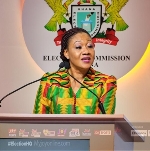
#2024 Polls: APC, MFC demand Jean Mensa’s resignation over election mismanagement
09:44
Bawumia attends burial of late Ashanti Regional Chief Imam in Kumasi
17:21
John Dumelo begins MP duties ahead of swearing-in
12:26
CHASS demands immediate payment of outstanding funds to SHSs
09:44
EC 'useless' press confab targeted at diluting NDC's parliamentary strength-Omane Boamah
17:58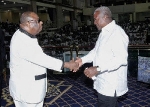
We pray there will be no negative narratives under your gov’t – Duncan-Williams to Mahama
06:27
Only NPP looting brigade not excited about ORAL – Ablakwa
07:26
Increase betting tax to 50% to protect youth: ICS to President-elect Mahama
17:06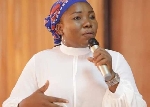
All ongoing recruitments captured in 2024 budget; no new warrant has been issued since December 7 polls - Information Minister
06:23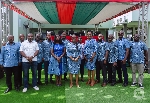
Zoomlion employees honoured for dedication at end-of-year party
01:01



